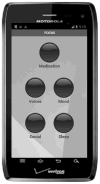Development and usability testing of FOCUS: a smartphone system for self-management of schizophrenia
- PMID: 24015913
- PMCID: PMC4357360
- DOI: 10.1037/prj0000019
Development and usability testing of FOCUS: a smartphone system for self-management of schizophrenia
Abstract
Objective: Mobile Health (mHealth) approaches can support the rehabilitation of individuals with psychiatric conditions. In the current article, we describe the development of a smartphone illness self-management system for people with schizophrenia.
Methods: The research was conducted with consumers and practitioners at a community-based rehabilitation agency. Stage 1: 904 individuals with schizophrenia or schizoaffective disorder completed a survey reporting on their current use of mobile devices and interest in mHealth services. Eight practitioners completed a survey examining their attitudes and expectations from an mHealth intervention, and identified needs and potential obstacles. Stage 2: A multidisciplinary team incorporated consumer and practitioner input and employed design principles for the development of e-resources for people with schizophrenia to produce an mHealth intervention. Stage 3: 12 consumers participated in laboratory usability sessions. They performed tasks involved in operating the new system, and provided "think aloud" commentary and post-session usability ratings.
Results: 570 (63%) of survey respondents reported owning a mobile device and many expressed interest in receiving mHealth services. Most practitioners believed that consumers could learn to use and would benefit from an mHealth intervention. In response, we developed a smartphone system that targets medication adherence, mood regulation, sleep, social functioning, and coping with symptoms. Usability testing revealed several design vulnerabilities, and the system was adapted to address consumer needs and preferences accordingly.
Conclusions and implications for practice: Through a comprehensive development process, we produced an mHealth illness self-management intervention that is likely to be used successfully, and is ready for deployment and systemic evaluation in real-world conditions.
PsycINFO Database Record (c) 2013 APA, all rights reserved.
Figures
References
-
- Ainsworth J, Palmier-Claus JE, Machin M, Barrowclough C, Dunn G, Rogers A, Lewis S. A comparison of two delivery modalities of a mobile phone-based assessment for serious mental illness: Native smartphone application vs text-messaging only implementations. Journal of Medical Internet Research. 2013;15:e60. doi: 10.2196/jmir.2328. - DOI - PMC - PubMed
-
- Ben-Zeev D, Drake RE, Corrigan PW, Rotondi AJ, Nilsen W, Depp C. Using contemporary technologies in the assessment and treatment of serious mental illness. American Journal of Psychiatric Rehabilitation. 2012;15:357–376. doi: 10.1080/15487768.2012.733295. - DOI
-
- Brinck T, Gergle D, Wood SD. Usability for the Web: Designing Web sites that work. Burlington, MA: Morgan Kaufmann; 2001.
Publication types
MeSH terms
Grants and funding
LinkOut - more resources
Full Text Sources
Other Literature Sources
Medical



